- House prices could fall 15 per cent
- Company pays £344mn cladding bill
What a difference six months make. In March, when Bellway (BWY) posted its interim results covering the six months to 31 January, the housebuilder waved aside interest rate rises as “modest” and insisted that its “mid-market product remains affordable in a historical context”. Jump forward to its results for the year to 31 July and the rhetoric around rising interest rates has changed – described now as a “near-term headwind”.
That’s one way of putting it. Another would be a disaster for both demand and values. Predictions vary wildly, but modest estimates point to a 10 to 15 per cent fall in house prices. If realised, that drop would be enough to completely wipe out the 13 per cent gain in revenue the company has made over the last financial year. Bellway is not unaware of this and said it is now making some business assumptions in line with its “experience in the 2008-09 global financial crisis” – a thought which should make any investor shudder.
In Bellway’s defence, the company had little way of knowing that the first fiscal statement under prime minister Liz Truss would wreak such havoc on the mortgage market. However, signs that some sort of housing downturn was on the way have been there for months. Even before the interest rate spike, house prices had rocketed to a point where mortgages were out of reach for many, the cost of living crisis and energy bills were eating into people’s budgets, and the end of the Help to Buy scheme was looming. A price correction has been a long-time coming, but few expected it to be this drastic.
Average weekly sales at Bellway have dropped 12.4 per cent year-on-year for the nine weeks to the start of this month. When compared with 2020, they have plunged 20.1 per cent.
These drops are worrying considering the below-average profit margins that large housebuilders such as Bellway operate on. This year, the housebuilder’s pre-tax earnings were 8.6 per cent of its revenue. It is hard to say whether the market going south will move that margin into loss territory, but the fact is inflation is causing construction costs to rise as interest rates are pushing house prices down.
And then there are cladding and fire safety costs – the large and incalculable price of righting the wrongs of Grenfell which has already caused so many of housebuilders to post losses in their results this year. For its part, Bellway reported a £344mn bill for fixing unsafe properties compared with a £51.8mn bill last year. All of the housebuilders are singing from the same hymn sheet here: Yes, these costs are large; but they are one offs and don’t impact the underlying profitability of the business.
We are somewhat more circumspect. The near £400mn Bellway has doled out so far is a direct result of former housing secretary Michael Gove’s determination to make housebuilders and housing developers pay to sort out the UK’s cladding and fire safety crisis after years of flip-flopping from previous ministers over who should bear the cost. Since then, the housing secretary has changed twice and the government (at the time of writing…) has changed once. It is therefore impossible to say for sure how much more the housing department will ask housebuilders to pay going forward because the department has never had a settled view on the issue.
Despite all of this, there are reasons to be bullish about Bellway. The company is, after all, still making healthy revenues and profit, even if the latter has fallen over this reporting period due to the aforementioned cladding costs. Bellway’s rock-bottom price to current earnings ratio also means that, even if revenues and profits fall, the stock would remain relatively cheap. It is trading at a hefty discount to net asset value and has a sky-high dividend yield as well.
There is an argument to be made that, in Bellway’s case, the equity market has overreacted to the poor trading environment for housebuilders. Even still, it is hard to continue to justify the ‘Buy’ rating for this stock. Though we feel BWY is far too lowly priced relative to its revenue and profits to sell, the stock of this housebuilder – or any housebuilder – is not a wise one to double down on at this time. Hold.
Last IC view: Buy, 2,544p, 29 Mar 2022
| BELLWAY (BWY) | ||||
| ORD PRICE: | 1,787p | MARKET VALUE: | £ 2.2bn | |
| TOUCH: | 1,782p-1,788p | 12-MONTH HIGH: | 3,513p | LOW: 1,572p |
| DIVIDEND YIELD: | 7.8% | PE RATIO: | 9 | |
| NET ASSET VALUE: | 2,727p | NET CASH: | £245mn | |
| Year to 31 July | Turnover (£bn) | Pre-tax profit (£mn) | Earnings per share (p) | Dividend per share (p) |
| 2018 | 2.96 | 641 | 423 | 143 |
| 2019 | 3.21 | 663 | 438 | 150 |
| 2020 | 2.23 | 237 | 157 | 50.0 |
| 2021 | 3.12 | 479 | 317 | 117.5 |
| 2022 | 3.54 | 304 | 197 | 140 |
| % change | +13 | -37 | -38 | +19 |
| Ex-div: | 01 Dec | |||
| Payment: | 11 Jan |











